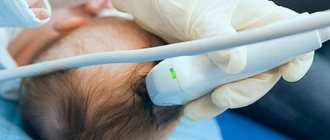Insomnia before menstruation: main causes
As medical statistics show, 70% of the fair sex have experienced insomnia at least once in their lives before the onset of their period.
Insomnia, which occurs before the onset of menstruation, manifests itself in different ways - some women cannot fall asleep for a long time, others constantly wake up, thereby not being able to get a full night's sleep. As a rule, insomnia before menstruation occurs 2-3 days before the onset of menstruation, so many ladies immediately guess why the problem has developed. Gynecologists consider this phenomenon as preparing the body for blood loss, as well as a sharp change in hormonal levels.
Therefore, they do not believe that menstrual insomnia requires treatment, since it will go away on its own after the onset of menstruation.
Premenstrual syndrome and causes of insomnia
To understand the causes of insomnia during PMS, you need to know what this formulation is. PMS is a premenstrual syndrome, during the development of which a complex complex of hormone activation occurs in the female body. This affects the functioning of the heart, endocrine and nervous systems, as well as the vascular network.
These problems, as a rule, are associated precisely with the beginning of the development of critical days, that is, they say that menstruation will begin in 2-3 days. There is no point in thinking that a woman is developing a disease of one of the above organs or systems, since the symptoms that appear during premenstrual syndrome only indicate menstruation.
Sometimes representatives of the fair sex may notice pain or discomfort in the heart, an increase in nervous activity, but there is no need to take any measures to treat this condition.
Signs of the onset of the premenstrual period are as follows:
- increased desire for a sexual partner;
- pelvic pain of varying nature and intensity;
- physical weakness;
- high and causeless irritability;
- general discomfort in the body;
- increase in appetite.
Why does insomnia develop during premenstrual syndrome? Doctors identify several causes, one or more of which may be responsible for insomnia. These include:
Hormonal balance
To begin with, it is worth noting the sharp change in the hormonal balance in the body, or more precisely, in the woman’s blood. Before the onset of menstruation, the level of sex hormones, namely estrogen and progesterone, increases sharply. Such substances are responsible for the normal and natural onset of ovulation.
insomnia before menstruation
If there is a violation in their quantity or ratio, this can lead to serious hormonal imbalance, which negatively affects overall health. At this time, the patient will notice a strong sexual desire, and will also suffer from lack of sleep, because her body will not work in its usual mode, which means that the body will not be able to relax, which contributes to normal sleep.
Change in micronutrient levels
We also must not forget that during the menstrual cycle in the human body there is a decrease in certain types of microelements. To a greater extent, these include calcium, which is present in large quantities in the endometrial layer - it is this that comes out of the vagina during menstrual periods, creating red blood discharge.
The absence of this element negatively affects the functioning of the body, since it must be present in a person for a normal and healthy existence. A lack of calcium leads to health problems and the development of pathological symptoms.
For example, these include the appearance of seizures, frequent and causeless irritability, blood clotting disorders, and so on.
This is why doctors say that the onset of insomnia can occur before the onset of menstrual periods - this phenomenon is associated with a lack of nutrients in the body.
Such reasons are considered the main ones - why insomnia occurs during the premenstrual period.
What does insomnia mean before menstruation starts?
Constant sleep problems for 5 days or more cause a large number of negative consequences for a woman’s health. After all, it is known that you need to sleep at least 8 hours a day so that the body is rested and saturated with energy. Otherwise, lack of sleep will cause serious consequences that will negatively affect the physical and emotional state of the lady.
The onset of menstrual periods is always associated with heavy stress on the body, which is primarily caused by a surge in hormones. Lack of normal and complete sleep will cause the following consequences for a woman’s health:
- weakness;
- frequent irritability and aggression;
- prostration;
- lack of desire to do anything.
Therefore, when insomnia develops, it is necessary to take measures to treat menstrual syndrome, which will help restore proper sleep and normal health. At the same time, you should not engage in home therapy methods, otherwise you can only worsen the course of insomnia.
Attention! If a woman’s insomnia lasts more than 5 days, this condition should not be ignored, since the body is unlikely to be able to recover on its own, and chronic lack of sleep will cause more and more harm to the patient every day.
Although critical days occur only once a month, insomnia can occur much more often, especially if the cause of its development is premenstrual syndrome.
How can a woman get full and healthy sleep back?
What to do if sometimes insomnia appears before the onset of menstruation? If you notice its appearance at an early stage of development, you can immediately take action, and then the pathology will not “grow” and turn into an advanced form.
At first, when signs of insomnia are detected, a woman can begin to independently fight insomnia, paying special attention to her diet and lifestyle. In this case, there is no need to immediately take drastic measures and drink sleeping pills, since it will only give a temporary effect. To prevent the onset of insomnia, it is recommended to follow the following recommendations:
- Before the possible onset of the menstrual cycle, it is recommended to give up drinks containing caffeine and ethanol for several days. At this time, doctors advise drinking natural drinks, namely teas, healing infusions, milk and juices. You can make it easier to fall asleep with a glass of warm milk or buckwheat or linden tea.
- It is imperative to reconsider your own diet - it is better to replace fatty and fried foods with dietary and natural products. These include vegetables, fruits, and dairy products, which contain vitamin E, microelements and other beneficial substances.
- Doctors advise eating persimmons, dried apricots and prunes every day before the onset of menstruation, which can provide the body with magnesium and calcium. In addition, such products promote sleep because they contain substances similar to the sleep hormone melatonin.
- In the evenings, you need to relax your body - for this you can go for a walk in the fresh air, do yoga, or just take a comfortable position and listen to music. If you can’t relax using these methods, it is recommended to take a healthy and relaxing bath with pine branches, chamomile or any aromatic oil (lavender and rosemary have worked especially well). This will help calm the nervous system and also give the body a pleasant calmness. How long can you stay in the bath before bed? This is usually done for 10-15 minutes, during which the body has time to completely rest and relax.
- To calm the body and saturate it with oxygen before going to bed, you should thoroughly ventilate the room in which the woman sleeps. It is also not recommended to stay up late - after airing, you should immediately go to bed.
- Be sure to create the correct daily routine - go to bed and get up at the same time. Over time, the body will develop a routine, and the woman will be able to quickly fall asleep immediately after going to bed.
- If a woman’s diet does not contain enough useful substances, such as magnesium, calcium and iron, you can consult a doctor about taking dietary supplements or vitamins - they will help fill the deficiency of elements, which will allow you to quickly fall asleep before the onset of your period.
- Before going to bed, you can do calm and relaxing exercises - this is necessary in order to reduce the level of adrenaline in the body. But you need to perform all the movements correctly, because otherwise the body will become more alert and the woman will definitely not be able to fall asleep.
These methods can be used if insomnia has not become chronic, characterized by a complete lack of sleep throughout the night. Judging by the reviews, if you start following these rules in a timely manner, you will be able to restore full sleep even before the end of the menstrual cycle.
In severe cases, doctors prescribe the woman sedatives and hypnotics, as well as tranquilizers, which will help restore the body’s natural biorhythms. It is unacceptable to take such drugs without the knowledge of a doctor, as they have a number of contraindications and side effects.
By following all the rules, you will be able to cure insomnia without drugs, which means that the woman’s body will not suffer from constant saturation with chemicals that it does not need during menstrual periods.
Source: https://ZdoroviySon.com/bessonnitsa/pered-mesyachnymi.html
How to get good sleep back
To get rid of unpleasant symptoms, it is recommended to consult a doctor. The doctor will select the appropriate treatment option.
It is recommended to avoid fatty, fried foods that are difficult to digest. The amount of vegetables and fruits on the menu should be increased.
You need to go to bed at the same time, and it is also recommended to get up on a schedule. Moderate physical activity is beneficial.
Treatment with drugs
Insomnia during menstruation can be eliminated with the help of special medications. Medicines should be prescribed by a doctor who takes into account the characteristics of the female body during the period before menstruation.
Supplements are often prescribed. You should take calcium, iron, vitamins C and B6, and magnesium. Dosages are selected individually.
Homeopathic remedies may be prescribed. They eliminate anxiety and have a calming effect. Such medications have few contraindications and do not cause addiction.
Synthetic options are prescribed in severe cases. Sedatives and antidepressants can be used. Sometimes taking tranquilizers is required. You can take these medications only as prescribed by your doctor.
Hormone therapy can help treat hormone imbalances that cause sleep disorders. Drugs are selected based on test results.
Folk remedies
You can also get rid of insomnia during menstruation using traditional methods. Drinking chamomile or mint tea helps. A week before the start of menstruation, you should give up alcoholic and caffeine-containing drinks, replacing them with decoctions of medicinal herbs.
Falling asleep will become easier if you drink a glass of warm milk in which 1 tsp is dissolved 30 minutes before bedtime. linden honey.
Before going to bed, you should take a bath with pine decoction. The water should be warm.
You can use aromatic oils. Lavender helps a lot. You should drop a little onto a napkin and place it at the head of the bed. You can light special incense sticks.
Insomnia after menstruation
Insomnia before or during menstruation is a common disorder. It lays the foundation for other pathological phenomena - mood swings, lack of appetite, fatigue, or develops against the background of such.
Over the course of several days of physiological malaise, many women note problems with the quality and duration of sleep, undergo neurological disorders, and feel psychological depression.
Only a specialist can give recommendations on what to do to normalize your well-being.
Causes
Insomnia during menstruation does not develop without reason, but only due to the influence of many predisposing factors, including:
- Previous curettage of the uterine cavity. The destruction of the mucous membrane occurs differently in each woman. Violation of the integrity of the endometrium (inner layer of the uterus) requires long-term healing and restoration. For some women, this process is painless, while for others it may be accompanied by pain and general discomfort.
- Prolonged diseases of the reproductive system, especially if the pathologies are inflammatory in nature.
- Infectious diseases.
- Previous surgical interventions on the organs of the reproductive system.
- A hereditary predisposition that may cause insomnia during menstruation.
- It has been noted that women with nicotine or alcohol addiction are more likely to suffer from poor health before menstruation and throughout their entire period.
- Staying in a stressful environment, which affects the patient’s well-being. Less often, the cycle is interrupted, menstruation stops completely; more often they become abundant. Sleep disturbance in this case will occur due to the need to frequently change consumables, which requires waking up several times during the night.
- Inability to visit the toilet in a timely manner.
- Decreased serotonin concentration in the blood.
- Chest pain, dizziness, and a feeling of general malaise are caused by a lack of magnesium and pyridoxine in the body.
- The presence of excess weight predisposes to many problematic conditions, and often sleep disturbance is only a small manifestation of these.
The state of hemoglobin before menstruation, and especially during the time it began, also matters. Uncompensated blood loss leads to weakness - this feeling does not allow you to rest and causes problematic, long periods of falling asleep.
Treatment
Insomnia before menstruation, as well as during it, can be corrected - it is important to find out the disease that was the root cause of the sleep disorder.
The specialist is guided by the results of the research; information obtained during the inspection and interview.
Traditional treatment for sleep disturbances before menstruation involves the following:
- Antiprostaglandins that effectively relieve pain.
- Venotonics are prescribed to relieve the feeling of heaviness in the legs.
- Antidepressants and sedative medications.
- Diuretics, which, due to their effect, reduce the level of intracranial pressure, thereby reducing pain.
- Drugs aimed at improving blood circulation in brain tissue.
- Hormonal substances, the most commonly used are progesterone.
- Hormonal contraceptives that allow you to “unload” the function of the ovaries.
In extremely severe cases of insomnia, psychotherapy is prescribed. If the problem is poor circulation in the pelvic organs and accompanying pain, the doctor will write a referral to attend a course of physiotherapy.
How to deal with insomnia during menstruation
Since insomnia is no less common during menstruation, there are the following options to help you feel better during your period. From what to do on your own to eliminate insomnia:
- Insomnia during menstruation often occurs against the background of an increase in temperature. During menstruation, the body of some women tends to exhibit changes in hormones through hyperthermia - an increase in overall body temperature. Fever, discomfort and weakness prevent you from fully relaxing and falling asleep.
- Normalize blood circulation, blood flow from the uterus. To do this, it is permissible to take B vitamins; supplements containing magnesium.
- Apply a heating pad to the lower abdomen, but only if cases of uterine bleeding have not previously been detected. The heat will have an analgesic, relaxing effect, and insomnia during menstruation will be relieved.
- Avoid coffee, which has a negative impact on kidney function. Caffeine stimulates urine production, which causes constant bladder overflow during menstruation. During menstruation, it is better to drink herbal teas. Then you will be able to get rid of the pain and fall asleep normally.
- Avoid overfilling the bladder and digestive tract. Since the uterus is anatomically located between the rectum and the bladder, overfilling of each of them contributes to compression of the reproductive organ. Consequently, the pain also increases. As soon as a woman empties her bladder or bowels, the pain decreases.
- Adjust your diet. Avoid overloading the intestines with heavy foods to prevent the development of constipation and increased pain in the lower abdomen and lumbar back.
- Inhalation with a decoction of medicinal plants. It relaxes and saturates the body with useful substances.
- Avoid tight, constrictive clothing during menstruation. Excessively tight clothing causes discomfort and increased bleeding. Each of these conditions is undesirable - your health worsens, insomnia, irritability, and apathy develop. Choose loose, soft clothing with minimal unnatural fiber content.
- Avoid hypothermia. If inflammation occurs during menstruation, the health condition will worsen significantly.
- Avoid watching exciting films and TV shows. Hormones during menstruation, as well as shortly before them, vary widely. Therefore, any stressful influence causes sleep disturbance.
- Avoid physical activity during menstruation. If training is an integral part of life, do not perform exercises to strengthen the abdominal muscles or lift heavy loads. The workout should end at least 3 hours before going to bed.
- Drink more water. Other drinks - tea, juices - are not taken into account. A woman should drink at least 1.5 liters of purified water per day to prevent the formation of blood clots, which, if present, make it more difficult for the uterus to cleanse. And in order to push the blood out, effort is required - the organ contracts even more intensely, which is physically noticeable. First of all – pain, spasms.
It is unacceptable to perform a massage before visiting a doctor - stroking movements on the lower abdomen will allow you to relax and have a distracting effect. You need to focus on your well-being, but don’t devote all your time to it, going to extremes.
Suspiciousness and anxiety prevent proper rest. It is also important to maintain good sleep hygiene. The temperature in the room should be cool, the air should be fresh, and the bed should be comfortable.
Evening walks and drinking warm milk with honey will have a beneficial effect on the body’s condition and will help you fall asleep quickly.
Source: https://o-kak.ru/bessonnica-posle-mesjachnyh/
Insomnia during menstruation
Insomnia during menstruation brings certain inconveniences. Not only can your stomach, headache, and chest swell during this period, but you also don’t get a full, healthy sleep. Why might this happen? Is this condition harmless or is it worth worrying about? Is it possible to do something to change the situation? The answers to these questions will interest many girls and women of different ages.
Causes and consequences
All processes in the human body are interconnected and are responsible for its normal physical and mental state, therefore any failures of these systems lead to unpleasant consequences. Insomnia is one of the indicators of disturbances in the functioning of the body.
This is often how mental health problems manifest themselves. In any case, insomnia is a signal that the brain gives, trying to communicate that something is wrong in the body.
When such a symptom appears during menstruation, it is important to analyze:
- when insomnia occurs (at any time or only during menstruation);
- what kind of insomnia (disturbed period of falling asleep, difficult awakening or problem in shallow sleep);
- How long ago did the problem occur?
Having found the answers to these questions, you need to consult a gynecologist. After analyzing the collected data, conducting the necessary tests and examination, the gynecologist will prescribe the best treatment in this case or refer the patient for consultation to an endocrinologist, psychiatrist or neurologist.
The cause of insomnia, for example, may be a violation of the biological rhythm, a reaction to medications taken, or an unbalanced diet. If you add stress to the list, which is an invariable companion of almost every woman in today's world, a sleepless night is guaranteed.
As you can see, insomnia in women can be a symptom of a gynecological, endocrine, mental or neurotic disorder. As a result, it appears:
- irritability, even aggression;
- fatigue, lethargy;
- decreased ability to work, mental activity;
- tearfulness, headache, dizziness;
- anxiety, increased blood pressure.
In addition, the duration of such manifestations will inevitably affect relationships in the family and at work. So, insomnia during menstruation is by no means a harmless condition, but requires examination and treatment.
General recommendations for the prevention of insomnia in pregnant women
Prevention of insomnia in a pregnant woman begins with maintaining a daily routine. It is necessary to lead an active lifestyle, walk enough, and do the recommended physical exercises. 2 hours before bedtime you should not eat heavy food; dinner should be light. Before going to bed, be sure to ventilate the room. If you haven't been able to sleep for several nights in a row, this situation can become a habit.
Being in an interesting position, a woman gets tired much faster, and it is much more difficult for her to perform certain types of work. Serious injuries or falls can cause miscarriage.
It is difficult for an expectant mother who does not get enough sleep to maintain a positive attitude. It is necessary to create comfortable conditions for the young mother to fully rest for her health and the well-being of the baby.






